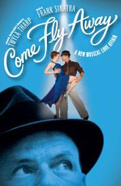What's Up, John Selya? Broadway's Dance Master on Channeling Sinatra in Come Fly Away
The amazing dancer John Selya became a Broadway headliner (and 2003 Best Actor Tony nominee) with his charismatic performance as blue-collar hero Eddie in Twyla Tharp’s Broadway hit Movin’ Out. After small roles in Tharp’s short-lived The Times They Are A-Changin’ and Guys and Dolls, Selya is back where he belongs, center-stage and smoldering in Tharp’s Sinatra salute Come Fly Away. For lovers of great dancing (and Frank’s music), this is show to see—and Selya is thrilled to be part of its high-flying cast. He chatted with Broadway.com about his dance-centric daily routine and why he identifies with Cassie in A Chorus Line.
Is it true you weren’t a big Sinatra fan before starting work on this show?
That’s right. I’m definitely more of a fan now! His voice has confidence, but without arrogance. He can come off as sensitive without being wimpy, and those are qualities I strive for in my dancing. He’s the perfect example of the range a male artist can have without compromising his masculinity.
How did you and Twyla Tharp come up with the character of Sid in Come Fly Away?
Twyla didn’t sit down with me and define it. The movement that she elects to give the characters defines them. We examined a bunch of approaches, from an older man to a creepy man, and those never really worked out.
Thank goodness!
Well, we tried it, and I was a good soldier about it. Finally we accepted the fact that this guy is just a dancer, and he should try to dance as well as he can. Once that was decided, all the other layers of the character revealed themselves through the choreography.
You’ve worked with Twyla many times now. What’s that like?
I have never worked with anybody as collaborative as Twyla. She allows you so much input into her vision, which is wonderful.
What’s she like personally?
I’m still trying to figure that out [laughs]. As long as I’ve been working with Twyla, she’s still a mystery to me. But it’s never boring, and she never wastes anyone’s time, and I respect that. A lot.
What percentage of your time do you spend dancing?
The majority of my waking hours are either dancing or preparing to dance. I get up in the morning and alternate ballet class and Bikram yoga, then I have a couple of hours off in the afternoon when I nap and eat. Then I go to the theater, do a warm-up and dance. On my day off, I usually sit and do nothing.
You’ve dated dancers. Can a non-dancer understand your life?
Now I date a singer, Jackie Burns, who was in Hair, and she understands. She’s unbelievable.
Aww! What type of music do you listen to?
A lot of alternative rock and hip-hop. Before I dance, I listen to Jay-Z and Notorious B.I.G. I love the Ramones, I love the Clash, I love Pearl Jam. I like Arcade Fire and Foo Fighters.
You began in ballet, but Movin’ Out turned you into a musical theater performer, didn’t it?
Absolutely, and I love it more than anything I’ve ever done. The whole Movin’ Out experience was so great in exposing me to Broadway, and I am so grateful that I was embraced and accepted and applauded on Broadway.
What’s been the biggest challenge in your Broadway career?
I could have a lot more options if I could sing better. You think, “I’m a dancer, everybody knows me, I can pick any role I want,” but it’s not like that—and I understand why it’s not like that.
Is it possible to be satisfied with smaller parts?
Oh, I’m totally happy with that! I love being part of productions in any way that the director or choreographer sees me serving the production. I grew up around Baryshnikov, who always did things he was curious about just for the sake of the experience, not for status. He was happy to be absorbed into an ensemble. I’ve never had that [feeling of] “If I’m not going to be featured, I have no interest in doing it.” A lot of performers don’t want to bend that way, but I enjoy working in any capacity.
You sound almost like Cassie in A Chorus Line—and she had a problem getting the director to believe she'd be satisfied in the chorus.
Exactly—and that can work against you. It’s like a real-life gender-bending Cassie situation.
How long will you continue to dance?
I don’t know. I hate to think about that! I hope I can do this for another five to 10 years, but I doubt it. I just turned 40, so as long as there are things out there I can do, that’s great. And when I’m no longer able to really do hard dancing, hopefully I’ll be able to do more acting. But I’m not dwelling on that right now.
